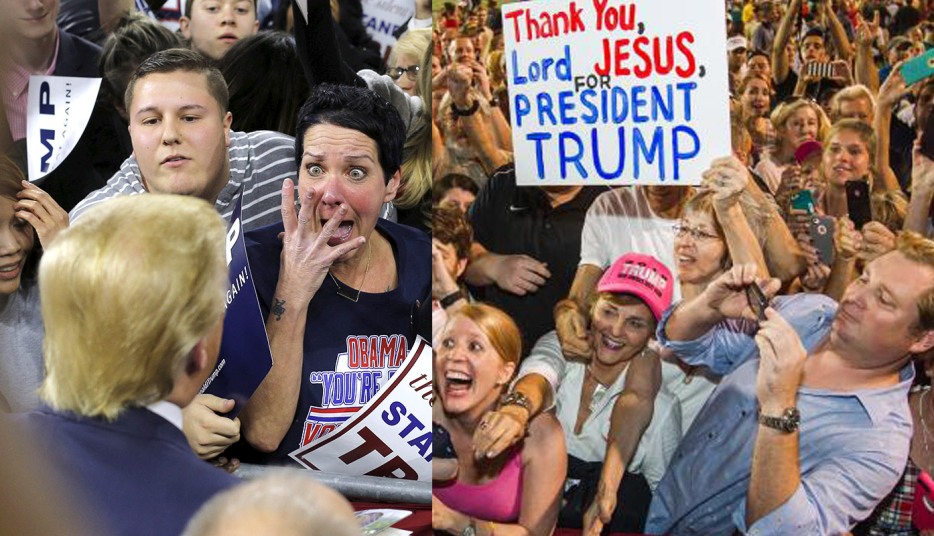
These are, without a doubt, the Holy Grail of cultural and political questions of the moment:
How does Trump appeal to his supporters?
Why do supporters continue to stand by him when he lies – even when confronted with the facts – more than any candidate in modern history?
What is it about this man that continues to attract both men and women – some with evangelical zeal – even after the release of a video of him boasting of sexual predatory behavior: “…when you’re a star… You can do anything”?
Sean Ransom, PhD is an assistant clinical professor in the Department of Psychiatry and Behavioral Sciences at Tulane University School of Medicine and founder of the Cognitive Behavioral Therapy Center of New Orleans.
Ransom looks into the psychology behind Trump supporters, (Oct. 12, from Sociological Images).
“Trump is a uniquely odious candidate who is quite likely going to lose, but more than 40 percent of Americans plan to vote for him. The science of group conflict might help us understand why.
“In a powerful 2003 article in the journal American Psychologist, Roy Eidelson and Judy Eidelson foreshadowed Trump’s popularity. Drawing on a close reading of both history and social science literature, they identified five beliefs that — if successfully inculcated in people by a leader — motivate people to initiate group conflict. Trump’s campaign rhetoric deftly mobilizes all five.
“Confidence in One’s Superiority: Trump constantly broadcasts a message that he and his followers are superior to other Americans, whereas those who oppose him are ‘stupid’ and deserve to be punched in the face. His own followers’ violent acts are excused as emanating from ‘tremendous love and passion for the country.’
“Claims of Unjust Treatment: Trump is obsessed with the concept of fairness, but only when it goes his way. Given his presumed superiority, it naturally follows that the only way he and his supporters could fail is if injustice occurs.
“Fears of Vulnerability: Accordingly, Trump has overtly stated that he believes the presidential election will be rigged. His supporters believe him. In one recent poll, only 16 percent of North Carolina Trump supporters agreed that if Clinton wins it would be because she got more votes.
“Distrust of the Other: Trump and his supporters routinely claim that the media, government, educational institutions, and other established entities are overtly undermining Trump, his supporters, and their values. To many Trump supporters, merely being published or broadcast by a major news outlet is evidence that a fact is not credible, given the certainty they have that media professionals are conspiring against Trump.
“A Sense of Helplessness: When Trump allows that it’s possible that he might lose the election because of fraud, conspiracy, or disloyalty, he taps into his followers’ sense of helplessness. No matter how superior he and his followers truly are, no matter how unjustly they are treated, there is little that they can do in the face of a nation-wide plot against him. Accordingly, many of Trump’s most ardent supporters will see the impending rejection of their candidate not as a corrective experience to lead them to reconsider their beliefs, but as further evidence that they are helpless in the face of a larger, untrustworthy out-group.”
This election is no longer about Republican v. Democrat. It is about simple human decency. It’s about fairness, responsibility, accountability, and a man running for the highest office in the land too self-absorbed to care about logic, facts or that segment of the electorate that swoons every time he speaks.
From an ethical perspective, Trump’s sense of fairness is clearly self-biased. He complains that a federal judge cannot render a favorable ruling in a case against him because of the judge’s heritage. He ridicules and accuses 10 women – who have come forward stating that they had been sexually manhandled by Trump – of being hired by the Clinton campaign. He wavers on accepting voters’ judgment on Election Day, then doubles-down, saying that he would accept the election results “…IF I WIN!”
A leader is one who accepts defeat, then gets up the next morning with a new perspective on what he has learned. Trump not only lacks the qualities of a leader, but cannot even admit to himself when he loses.
Trump constantly says, “Nobody respects women more than I do,” then turns to his debate opponent and growls, “…such a nasty woman.”
No matter the person, the issue or the business failure, Trump derides, dismisses, and denies. He takes no personal responsibility, and offers no direct apology – with the rare exception of some abstract “regret.”
Supporters – caught up in their own sense of defenselessness, anger and cynicism – continue to support Trump because they identify as victims of a system they believe is rigged against them, too.
However, when Trump loses, it won’t be because the election was hijacked by the media, the “global elites,” or the opposition, but rather by his supporters own fear and prejudice exploited by their own candidate – a man whose moral compass points only to himself.
On November 9th, Trump will go back to his brand and his businesses; he will succeed with some, lose with others (although he’ll never admit to the latter), but the legacy he leaves will linger with these questions:
What happens to all those supporters who continue to feel distrustful and disenfranchised? And when will they begin to think and take responsibility for themselves rather than invest their beliefs in a demagogue?
Comments
Leave a Comment










Great search Jim to find Eidelson and Eidelson’s article way back in 2003 foreshadowing a person in power; and I agree that Hillary’s opponent is not a leader and cannot admit when he is wrong or loses. Two of the five are:
“A Sense of Helplessness and Confidence in One’s Superiority.” Too bad the youth have to see this!
This is good stuff – confirmation bias rules.
Only in the U.S. could someone of Trump’s attainments insist that the system was rigged against him.